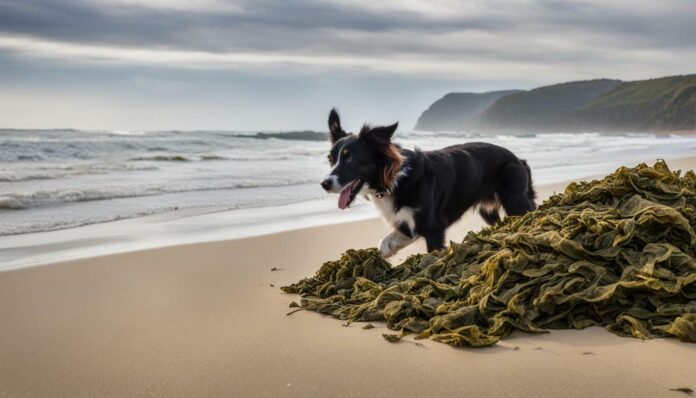Hey there, fellow pet parents! Ever caught your pup giving those puppy eyes while you’re munching on some sushi? Well I’ve got some pawsome news for you about seaweed paper and our four-legged friends!
The Quick Answer (For Busy Pet Parents)
YES! Dogs can totally have seaweed paper (nori), and it’s actually pretty good for them! But wait – there’s some important stuff you need to know first.
Why Seaweed Paper Can Be Amazing for Your Dog
Listen up because this is gonna blow your mind! Seaweed paper isn’t just some fancy wrap for your California rolls – it’s packed with some seriously good stuff
- Protein (yep, you read that right!)
- Vitamins A, B12, and C
- Minerals like iodine and iron
- Omega-3 fatty acids (great for that shiny coat!)
- Fiber (helps keep their tummy happy)
The Right Way to Give Seaweed Paper to Your Dog
Here’s the deal – you can’t just let your furry friend go crazy with seaweed paper. Here’s how to do it right:
- Start Small: Just like trying anything new, begin with tiny pieces
- Plain is Best: Choose plain, unseasoned seaweed paper
- Watch the Salt: Some seaweed snacks are super salty – avoid those!
- Moderation is Key: Think of it as a treat, not a meal replacement
⚠️ Important Warning Signs to Watch For
Even tho seaweed paper is generally safe keep your eyes peeled for – Choking hazards (especially with whole sheets)- Tummy troubles if they eat too much- Allergic reactions (rare but possible)
What Types of Seaweed Are Safe?
Not all seaweed is created equal! Here’s what’s good:
- Nori (the stuff used for sushi) – TOP CHOICE!
- Wakame (in small amounts)
- Kelp (usually in supplement form)
Big NO-NOs When It Comes to Seaweed
Stay away from:* Seasoned seaweed snacks (too much salt and additives)* Wild seaweed from beaches (can be dangerous!)* Seaweed with added flavors or spices
How to Introduce Seaweed Paper to Your Dog
Ready to give it a try? Here’s your game plan:
- Break it into small pieces
- Give just one piece first
- Wait 24 hours to check for any reactions
- If all good, you can make it an occasional treat
Creative Ways to Serve Seaweed to Your Pup
Make it fun! Try these ideas:* Crumble it over their regular food* Use it as a training treat* Mix small pieces into their favorite puzzle toy
Health Benefits Deep Dive
Let’s get nerdy for a minute! Seaweed paper can help with:
- Thyroid function (thanks to that iodine)
- Immune system support
- Dental health (the texture can help clean teeth)
- Digestive health (fiber for the win!)
When to Say “No” to Seaweed
Sometimes, seaweed might not be the best choice:* If your dog has thyroid issues* When they’re on certain medications* If they’ve shown sensitivity to seafood
The Bottom Line
Seaweed paper can be a healthy, fun treat for your dog when given properly. Just remember:- Keep it plain- Serve in moderation- Watch for any weird reactions- Always supervise snack time
FAQs About Dogs and Seaweed Paper
Q: How much seaweed paper can I give my dog?A: Start with tiny pieces and don’t exceed 1/4 sheet per day for medium-sized dogs.
Q: Can puppies eat seaweed paper?A: Yes, but wait until they’re at least 12 weeks old and start super small.
Q: What if my dog ate a whole pack of seaweed snacks?A: Don’t panic! Just watch for tummy issues and contact your vet if you’re worried.
Real Talk: My Experience
Y’know what’s funny? My Lab literally does backflips when he sees me pull out the seaweed paper! But remember every dog is different – what works for one might not work for another.
Final Thoughts
Seaweed paper can be an awesome addition to your dog’s treat rotation! Just be smart about it, start slow, and watch your furry friend enjoy this healthy snack. And hey, maybe you’ll even save some money on your sushi nights since you’ll be sharing with your pup!
Remember to always chat with your vet before introducing any new foods to your dog’s diet, especially if they’ve got special health needs or are on medications.
Now go forth and share some seaweed safely with your four-legged friend! And don’t forget to come back and tell me how it went in the comments below!
Disclaimer: Every dog is unique, so what works for most dogs might not work for yours. Always consult with your veterinarian before making changes to your dog’s diet.












